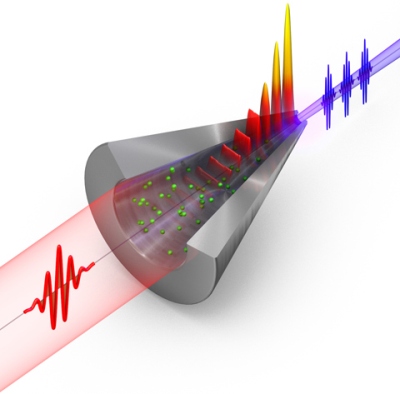Nano funnels can be used to efficiently concentrate light. Scientists belonging to the Max Planck Institute of Quantum Optics in Germany, Georgia State University in the USA and the Korea Advanced Institute of Science and Technology have used a three-dimensional silver nano funnel to concentrate infrared light pulse energy and have generated extreme ultraviolet (EUV) light flashes from the concentrated energy.
Pulsed EUV light is used in the field of laser physics for exploring atoms and molecules. The novel technology can aid in measuring electron movement with high temporal and spatial resolution.
 Scheme of the generation of EUV light by the 3D nano funnel. The infrared light (shown in red) is incident at the entrance of the Xe (green depicted particles) filled nano funnel (shown as a half-cut). The surface plasmon polariton fields (wave pattern) concentrate near the tip of the structure. Extreme ultraviolet light (shown in purple) is generated in the enhanced fields in Xe and exits the funnel through the small opening. Credit: Christian Hackenberger
Scheme of the generation of EUV light by the 3D nano funnel. The infrared light (shown in red) is incident at the entrance of the Xe (green depicted particles) filled nano funnel (shown as a half-cut). The surface plasmon polariton fields (wave pattern) concentrate near the tip of the structure. Extreme ultraviolet light (shown in purple) is generated in the enhanced fields in Xe and exits the funnel through the small opening. Credit: Christian Hackenberger
The scientists used the three-dimensional silver nano funnel and employed the high-harmonic generation process to convert infrared spectral range femtosecond (fs) laser pulses to EUV fs light flashes. This resulted in a EUV light source with a low 20 nm wavelength. The EUV light flashes repeated 75,000,000 times in a second and they last for a couple of fs.
The silver nanofunnel containing xenon gas has a 100 nm wide opening, which prevents infrared light having wavelengths of more than 100 nm from passing through. But it allowed the EUV light sources with 20 nm wavelength.
Attosecond light flashes are being used for exploring electron motion. Traditional techniques allow repetition only a few thousand times in a second. The nanofunnel may enable repetition at higher rates. In surface electron spectroscopy, repetition rates play a major role in the usage of EUV pulses.
The combined usage of nanotechnology and laser technology can help record movies in the attosecond-nanometer domain of ultrafast electron motion with high spatial and temporal resolution.